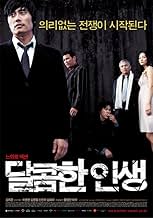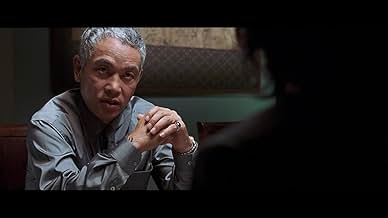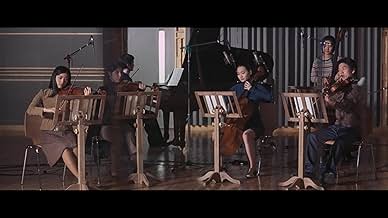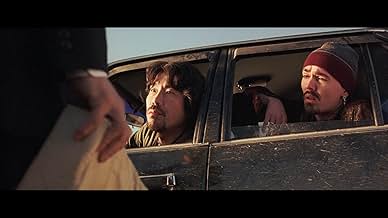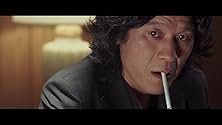Les choses tournent mal pour un caïd lorsqu'il ne suit pas les ordres de son patron.Les choses tournent mal pour un caïd lorsqu'il ne suit pas les ordres de son patron.Les choses tournent mal pour un caïd lorsqu'il ne suit pas les ordres de son patron.
- Réalisation
- Scénario
- Casting principal
- Récompenses
- 8 victoires et 14 nominations au total
Kim Yeong-cheol
- Mr. Kang
- (as Kim Young-chul)
Kim Hae-gon
- Weapon smuggler
- (as Hae-gon Kim)
Eric Moon
- Gun Dealer's Brother
- (as Eric)
Avis à la une
After Tale of Two Sisters, Ji-woon Kim's new movie has been eagerly anticipated. In his previous film, the marks of originality, intellectual challenge and superb visual style hailed the possibility of a brave new voice in Korean cinema.
A Bittersweet Life commences with similarly awesome photography and ambiance. The wind in the leaves of a tree - Is it the leaves or the wind that moves? asks the disciple of the master. Neither, he replies, it is your mind and heart that moves. Cut to La Dolce Vita, the swish bar restaurant which we are to discover is also the gangland stronghold of Sun-Woo. A single tree in the centre of the restaurant's sky lounge. The colours red and black, glossy and visually forceful in the lounge - they not only play heavily in the film but make any small deviations stand out. Lushness or delicacy is easily conveyed later in the film by colour, a respite to the bloodshed that will almost swamp us. A tinkling piano (Chopin is used as part of the score) adds a delicate counterpoint to what we know will surely be an overload of violence and mayhem.
Sun-Woo has served his boss, President Kang, faithfully for seven years and is now manager of Dolce Vita as well as Kang's right hand man. Background profits, and gang competition, focuses on innocuous little sidelines like the supply of guns or dancing girls, and which countries these should come from. Kang has a secret lover from the 'normal' world, a cellist who is much younger than he, and whom he suspects of infidelity. Kang entrusts Sun-Woo to sort it out and show no mercy. The warfare that follows goes beyond honour, beyond profit, beyond vengeance, . . . beyond any rational point in fact.
Sun-Woo is the ultimate cool bad guy. Indentured to a world of violence and expert in the use of martial arts, knives and guns, he is almost a humanised Bruce Lee who's woken up on a Tarantino set. It sounds almost too good to be true and it is. The story lines are formulaic and derivative, consisting largely of how to engineer more ingenious punch-ups, torture or revenge posturing. Light humour afforded in the contrast between suave topdogs and bumbling henchmen has been done so many times, and many of the entertaining debacles could have been borrowed from Kill Bill. But entertaining it is, on an undemanding level. Sadly it is not the work of the Master that we might have expected from Two Sisters. "The dream I had can't come true," laments the protagonist, and ironically the dreams Ji-woon Kim's fans may justifiably had don't quite come true in A Bittersweet Life, but this otherwise elegant shoot-em-up is still reasonable 'boys night out' night fare.
A Bittersweet Life commences with similarly awesome photography and ambiance. The wind in the leaves of a tree - Is it the leaves or the wind that moves? asks the disciple of the master. Neither, he replies, it is your mind and heart that moves. Cut to La Dolce Vita, the swish bar restaurant which we are to discover is also the gangland stronghold of Sun-Woo. A single tree in the centre of the restaurant's sky lounge. The colours red and black, glossy and visually forceful in the lounge - they not only play heavily in the film but make any small deviations stand out. Lushness or delicacy is easily conveyed later in the film by colour, a respite to the bloodshed that will almost swamp us. A tinkling piano (Chopin is used as part of the score) adds a delicate counterpoint to what we know will surely be an overload of violence and mayhem.
Sun-Woo has served his boss, President Kang, faithfully for seven years and is now manager of Dolce Vita as well as Kang's right hand man. Background profits, and gang competition, focuses on innocuous little sidelines like the supply of guns or dancing girls, and which countries these should come from. Kang has a secret lover from the 'normal' world, a cellist who is much younger than he, and whom he suspects of infidelity. Kang entrusts Sun-Woo to sort it out and show no mercy. The warfare that follows goes beyond honour, beyond profit, beyond vengeance, . . . beyond any rational point in fact.
Sun-Woo is the ultimate cool bad guy. Indentured to a world of violence and expert in the use of martial arts, knives and guns, he is almost a humanised Bruce Lee who's woken up on a Tarantino set. It sounds almost too good to be true and it is. The story lines are formulaic and derivative, consisting largely of how to engineer more ingenious punch-ups, torture or revenge posturing. Light humour afforded in the contrast between suave topdogs and bumbling henchmen has been done so many times, and many of the entertaining debacles could have been borrowed from Kill Bill. But entertaining it is, on an undemanding level. Sadly it is not the work of the Master that we might have expected from Two Sisters. "The dream I had can't come true," laments the protagonist, and ironically the dreams Ji-woon Kim's fans may justifiably had don't quite come true in A Bittersweet Life, but this otherwise elegant shoot-em-up is still reasonable 'boys night out' night fare.
I can see how this movie is well liked by many people. It's definitely different from a Hollywood movie, and a breath of fresh air from "the formula". At the same time, it's not so different as to cause discomfort or incomprehension. Violence is violence everywhere.
If you compare this movie against other great Asian action movie directors, than I think it's not that special. It's well done, but it's ultimately a light movie. A bit like an Asian version of an Hollywood action movie. There are some moments though (the end comes to mind), where the movie does show some signs of self awareness. But overall, it's a fairly straightforward, over the top gangster movie. If that's what you're looking for, you'll be pleased, but don't expect to be blown away by a masterpiece of cinema.
If you compare this movie against other great Asian action movie directors, than I think it's not that special. It's well done, but it's ultimately a light movie. A bit like an Asian version of an Hollywood action movie. There are some moments though (the end comes to mind), where the movie does show some signs of self awareness. But overall, it's a fairly straightforward, over the top gangster movie. If that's what you're looking for, you'll be pleased, but don't expect to be blown away by a masterpiece of cinema.
This masterpiece comes from the director of Tales of Two Sisters and he delivers an epic tale of revenge.
I can't urge you enough to see this movie. The gun battles are reminiscent of Scarface, the martial arts are gritty and realistic, the poignancy of unrequited love is painful, there is a deep philosophical current that underlies this film, and the camera work is superb-but that's not what carries the movie. The actor who plays the main character is what sets this magnificent movie apart from the trash put out by Hollywood. He's a man's man-sharply dressed in well tailored suits driving in a BMW sedan (like the transporter)through beautiful Seoul (showing what a beautiful, spotless, and vibrant city it is). He reaches the point of no return and his vengeance and determination are a tour de force.
Magnificent. Bravo. South Korean films reign supreme.
I can't urge you enough to see this movie. The gun battles are reminiscent of Scarface, the martial arts are gritty and realistic, the poignancy of unrequited love is painful, there is a deep philosophical current that underlies this film, and the camera work is superb-but that's not what carries the movie. The actor who plays the main character is what sets this magnificent movie apart from the trash put out by Hollywood. He's a man's man-sharply dressed in well tailored suits driving in a BMW sedan (like the transporter)through beautiful Seoul (showing what a beautiful, spotless, and vibrant city it is). He reaches the point of no return and his vengeance and determination are a tour de force.
Magnificent. Bravo. South Korean films reign supreme.
This is my first review on here, only because I felt compelled to tell someone about this film
When I say "coolest," I don't mean it in a that-movie-was-really-cool kind of way
Coolest, in this case, means that it is the smoothest, well-crafted, stylish, and beautiful films I have ever seen. Everything about the film has a you'll-never-be-this-cool feel, like Jules and Vincent from Pulp Fiction. Not to mention the fact that it has the same sort of humor.
Now, I am a film student who has actually gotten a lot of praise from students and teachers and whatnot for my first film project That's great and all, but after seeing this film I am reminded of what Steven Spielberg said after he saw The Godfather; "I guess I should quit now, because I will never make something this good." I am, in no way, comparing myself to Spielberg, I'm just describing the feeling of, "holy s***, this is amazing," and "wow, I could never do this ever "
See this movie before you die Or before it gets remade.
Now, I am a film student who has actually gotten a lot of praise from students and teachers and whatnot for my first film project That's great and all, but after seeing this film I am reminded of what Steven Spielberg said after he saw The Godfather; "I guess I should quit now, because I will never make something this good." I am, in no way, comparing myself to Spielberg, I'm just describing the feeling of, "holy s***, this is amazing," and "wow, I could never do this ever "
See this movie before you die Or before it gets remade.
For director Kim Jee-woon, humor is a basic element of films. And he says no matter how dark and moody it may seem, his new film ''A Bittersweet Life (Talkomhan Insaeng)¡¯¡¯ is no exception.
''This movie basically deals with relationship breakups resulting from small communication breakdowns,¡¯¡¯ Kim said during a news conference Monday after the preview screening of ''A Bittersweet Life.¡¯¡¯ Without calling it comedy exactly, sometimes audiences have to laugh at very serious or ironic situations, Kim said.
Kim has shown his unique morbid sense of humor in previous movies such as ''The Quiet Family,¡¯¡¯ a black comedy about a family who kill visitors to their cottage, ''The Foul King,¡¯¡¯ a comic drama about an amateur wrestler, and one horror contribution work for the omnibus film ''Three.¡¯¡¯ Kim is also behind ''A Tale of Two Sisters,¡¯¡¯ the psychological horror film that became a summer hit in 2003.
''A Bittersweet Life,¡¯¡¯ starring Lee Byung-hun from ''Everybody Has a Little Secret¡¯¡¯ and Shin Mina from ''Madeleine,¡¯¡¯ portrays the desperate and brutal revenge of Sun-woo (played by Lee) after he is expelled from his gang and comes close to being killed by his boss.
Lee Byung-hun is a hit-man who falls for the girlfriend of his boss in the stylishly violent ¡°A Bittersweet Life.¡± Conventional ideas of causation are put into doubt in director Kim Jee-woon's twist on film noire. ''A Bittersweet Life (Talkomhan Insaeng)'' is what Korean critics are describing as ''Action Noire.'' In it, he tweaks the traditional Korean gangster story line, presenting a work with film noire undertones and stylish cinematography.
Sun-woo (Lee Byung-hun) is a revenging dark angel dressed in black. Gang leader Kang (Kim Young-cheol) assigns Sun-woo, his right-hand man, to watch after his nubile girlfriend/professional cellist Hee-soo (Shin Mina) while he is away and find out about the other guy with whom he suspects she is messing around.
The plot is complicated by Sun-woo's existential decision to stray from the explicit instructions with which he is charged. He is cryptically told time and again to make good on a promise, but he never exactly know what that is.
Much of the action occurs in the long shadows the sprawling megapolis Seoul casts. Here, the gangsters wish they were too cool to be killed. No friend can really be trusted as the good guys are not so good and the bad guys can be down right evil. Importantly, the motivation of his tormentors is shrouded in mystery.
But the movie has been labeled ''action noire'' for a good reason. The stylistic ultra-violence of director Kim is superb. The creepy fisherman killer represents a unique Korean twist on the classic film noire villain. Our hero is not a good, good guy either, and I loved that about him. He is not only tough, but also a stone-face killer _ a tribute to both the director and actor's character interpretation.
After all, gangsters should fight to kill, and that means sometimes going for the knees and other joints, hitting low and dirty to take the guy out quick. In general, the fight scenes were creative. Watch for the face-dragged-across-the-cinderblock-wall scene, perhaps a first for cinematic violence.
''This movie basically deals with relationship breakups resulting from small communication breakdowns,¡¯¡¯ Kim said during a news conference Monday after the preview screening of ''A Bittersweet Life.¡¯¡¯ Without calling it comedy exactly, sometimes audiences have to laugh at very serious or ironic situations, Kim said.
Kim has shown his unique morbid sense of humor in previous movies such as ''The Quiet Family,¡¯¡¯ a black comedy about a family who kill visitors to their cottage, ''The Foul King,¡¯¡¯ a comic drama about an amateur wrestler, and one horror contribution work for the omnibus film ''Three.¡¯¡¯ Kim is also behind ''A Tale of Two Sisters,¡¯¡¯ the psychological horror film that became a summer hit in 2003.
''A Bittersweet Life,¡¯¡¯ starring Lee Byung-hun from ''Everybody Has a Little Secret¡¯¡¯ and Shin Mina from ''Madeleine,¡¯¡¯ portrays the desperate and brutal revenge of Sun-woo (played by Lee) after he is expelled from his gang and comes close to being killed by his boss.
Lee Byung-hun is a hit-man who falls for the girlfriend of his boss in the stylishly violent ¡°A Bittersweet Life.¡± Conventional ideas of causation are put into doubt in director Kim Jee-woon's twist on film noire. ''A Bittersweet Life (Talkomhan Insaeng)'' is what Korean critics are describing as ''Action Noire.'' In it, he tweaks the traditional Korean gangster story line, presenting a work with film noire undertones and stylish cinematography.
Sun-woo (Lee Byung-hun) is a revenging dark angel dressed in black. Gang leader Kang (Kim Young-cheol) assigns Sun-woo, his right-hand man, to watch after his nubile girlfriend/professional cellist Hee-soo (Shin Mina) while he is away and find out about the other guy with whom he suspects she is messing around.
The plot is complicated by Sun-woo's existential decision to stray from the explicit instructions with which he is charged. He is cryptically told time and again to make good on a promise, but he never exactly know what that is.
Much of the action occurs in the long shadows the sprawling megapolis Seoul casts. Here, the gangsters wish they were too cool to be killed. No friend can really be trusted as the good guys are not so good and the bad guys can be down right evil. Importantly, the motivation of his tormentors is shrouded in mystery.
But the movie has been labeled ''action noire'' for a good reason. The stylistic ultra-violence of director Kim is superb. The creepy fisherman killer represents a unique Korean twist on the classic film noire villain. Our hero is not a good, good guy either, and I loved that about him. He is not only tough, but also a stone-face killer _ a tribute to both the director and actor's character interpretation.
After all, gangsters should fight to kill, and that means sometimes going for the knees and other joints, hitting low and dirty to take the guy out quick. In general, the fight scenes were creative. Watch for the face-dragged-across-the-cinderblock-wall scene, perhaps a first for cinematic violence.
Le saviez-vous
- AnecdotesThe Korean title "Dalkomhan Insaeng" and the name of the bar "La Dolce Vita" translate to "The Sweet Life". As an ironic touch the International English title is called "A Bittersweet Life".
- GaffesToward the end of the film, when Kim Sun-woo is walking down the corridor searching for his former boss, a guard sitting and reading a newspaper gets up to stop him. Kim Sun-woo shoots him but his gun is not pointed at the guard. Rather, it is clearly pointed at the wall where fake blood appears after the shot like a paint gun.
- Citations
Sun-woo: One late autumn night, the disciple awoke crying. So the master asked the disciple, "Did you have a nightmare?" "No." "Did you have a sad dream?" "No," said the disciple. "I had a sweet dream." "Then why are you crying so sadly?" The disciple wiped his tears away and quietly answered, "Because the dream I had can't come true."
- Crédits fousAt the end of the credits, the sign above the bar that says "La Dolce Vita" is seen exploding.
- Versions alternativesTwo versions of the film exist, the original theatrical version and the director's cut. The director's cut's edits include slight cutting and re-arrangement of scenes, swapping music placement and some additional scenes that do not appear in the original version of the film.
- ConnexionsReferences La dolce vita (1960)
Meilleurs choix
Connectez-vous pour évaluer et suivre la liste de favoris afin de recevoir des recommandations personnalisées
Détails
Box-office
- Montant brut mondial
- 10 080 808 $US
- Durée
- 1h 59min(119 min)
- Couleur
- Mixage
- Rapport de forme
- 2.35 : 1
Contribuer à cette page
Suggérer une modification ou ajouter du contenu manquant

